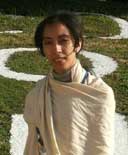Christian ties Jordan’s rich and poor |
Zureikat prefers sharing over donation
As the bus stops, boys rush to receive their faithful friend, Rabee Zureikat, and his guests, who came to visit Ghor Al-Mazraa after 110-kilometer southward journey from Jordan’s capital, Amman.
The visitors are first-timers here but 30-year old Zureikat enjoys the respect of a local elder. Christian by belief, Zureikat can be taken for a local who see this Karak-resident as a sincere friend.
All this respect stems from a novel idea of connecting urban rich and rural poor through exchange instead of donation.
“With growing class difference and lessening respect for traditions, I chose not only to develop social relations between two classes of society but also take people to their roots,” Zureikat explains the concept behind his work.
For his project ‘Zikra’ meaning memory, he has been shuttling urbanized elite to rural and semi-developed areas of Jordan. Zureikat’s weekly entourage comprises 24 Amman residents. Sometimes, foreigners also come along to see life in Jordan’s countryside to see for themselves traditions and customs, that no tourist guide can explain them enough.
"I named the activity ‘Zikra’ as memory being the only thing that stays with humans" Zureikat says.
While working in Toyota car company, he started to distribute clothes and provide in-kind assistance to predominantly Muslim population of Ghor Al-Mazraa in 2007, but it “proved embarrassing rather than comforting,” he recalls during an interview. He thought that donations harm dignity of the recipient.
He adds confidently: “We can respect the poor's dignity this way . . . no preference over one another . . . the poor can offer so much that the rich have lost or never had, like crafts and traditions."








 Abeer Hisham Abu Taoq is correspondent for online newspaper, Ain. She has won numerous journalism awards, including first place in the competition of Environmental Media. She is currently director of the Amman's Jeeran site, besides volunteering for some organisations and civil society institutes in Amman.
Abeer Hisham Abu Taoq is correspondent for online newspaper, Ain. She has won numerous journalism awards, including first place in the competition of Environmental Media. She is currently director of the Amman's Jeeran site, besides volunteering for some organisations and civil society institutes in Amman.
Post new comment